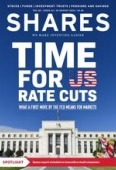Archived article
Please note that tax, investment, pension and ISA rules can change and the information and any views contained in this article may now be inaccurate.
Will UK shop price deflation open the door to a September rate cut from the Bank of England?

UK shop prices experienced deflation for the first time in almost three years in August with a fall of 0.3%, according to the latest data from the monthly BRC-NIQ (British Retail Consortium-NielsenIQ Shop Price Index).
The price deflation was driven by the non-food segment which came in at -1.5% in August, deepening by 60 basis points month-on-month, year-on-year, and 40 basis points below the three-month rolling average rate of -1.1%.
‘The price deflation was driven by the non-food segment where discretionary goods demand has been weak, food, as we have argued for some time, remained in inflationary territory, coming in at 2%, a broadly manageable level for households.
‘The [Bank of England’s] MPC (monetary policy committee) may be concerned about UK wage and service inflation, but it should sleep easy on the retail component, where, if anything, the grounds for a base rate cut is evident, if it takes note of the data,’ says Shores Capital’s head of consumer research Clive Black.
The fall in UK shop prices creates space for the Bank of England to cut rates further when it meets on 19 September. This event which will be overshadowed by the US Federal Reserve’s two-day meeting on 17-18 September when it is widely expect to cut rates for the first time in this cycle –the Bank of England having taken the plunge at the beginning of August.
Then five members voted in favour of cutting rates from 5.25% to 5% and four members voted to leave rates unchanged. Federal Reserve chair Jerome Powell said last Friday (23 August) that the ‘time has come’ to begin lowering interest rates at the Jackson Hole economic policy symposium.
Powell confirmed at the three-day meeting of central bankers, policymakers, and global economists that the Fed would not welcome any further downturn in the US jobs market. Sterling soared against the US dollar to a 29-month high after Powell’s remarks reaching above $1.32 – more than a cent up on the day – the highest level since March 2022.
While Powell seems confident of the US central bank’s next move, the governor of the Bank of England Andrew Bailey is cautiously optimistic about the UK inflation outlook, but added in his own speech at Jackson Hole he will not be rushed into further rate cuts. Bailey said on 23 August: ‘The second-round inflation effects appear to be smaller than we expected. But it is too early to declare victory.’
Important information:
These articles are provided by Shares magazine which is published by AJ Bell Media, a part of AJ Bell. Shares is not written by AJ Bell.
Shares is provided for your general information and use and is not a personal recommendation to invest. It is not intended to be relied upon by you in making or not making any investment decisions. The investments referred to in these articles will not be suitable for all investors. If in doubt please seek appropriate independent financial advice.
Investors acting on the information in these articles do so at their own risk and AJ Bell Media and its staff do not accept liability for losses suffered by investors as a result of their investment decisions.
Issue contents
Ask Rachel
Feature
Great Ideas
News
- Watkin Jones shares pummeled on cut to guidance
- Beeks Financial Cloud scales new all-time high after record results and contract extension
- Powell signals start of interest rates cuts at Jackson Hole
- Will UK shop price deflation open the door to a September rate cut from the Bank of England?
- Temu parent PDD sends warning on Chinese consumers
 magazine
magazine








